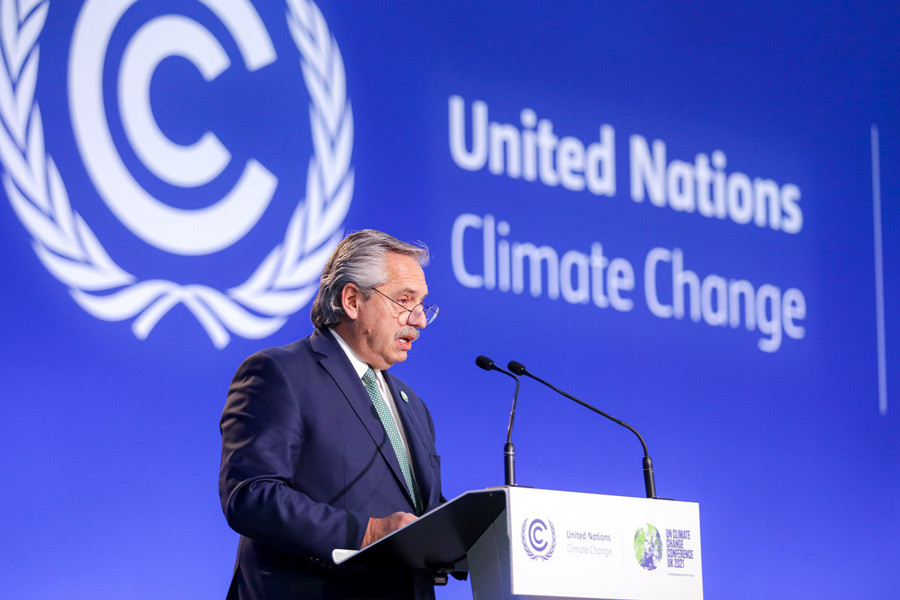
Casa Rosada (Argentina Presidency of the Nation), CC BY 2.5 AR , via Wikimedia Commons
It is a curious fact that although the global food system causes around a third of anthropogenic greenhouse gas emissions, it was largely absent from the agendas for discussion at COP26. Cars, coal, cash and trees, the Prime Minister kept repeating: not ‘farming’, ‘food supply chains’ or ‘diets’.
There are many possible explanations for this omission – rolled together, they might amount to: ‘that one’s just too tricky and divisive for now’. But a relevant factor may be the power of the food industry to protect its interests, not least by making sure its voice is heard at critical inter-governmental meetings.
The FRC has studied the United Nations’ official list of registered participants to COP26 in Glasgow, which provides details of the 21,695 people registered to attend from individual countries, as well as the 14 033 people who attended COP26 as observers. Participants from individual countries (‘Parties’) can take part in negotiations, while observers are permitted to make statements, hold side events and exhibits, provide written submissions on various issues under negotiation, and provide informal expert advice during workshops and intersessional meetings.
We have identified numerous participants with links to the food system – and in particular representatives of the food industry – who may seek not simply to observe proceedings, but also to exert a level of influence.
By our count (and we may have missed some), at least 75 representatives from 32 food and drink companies and/or trade associations attended COP26.
These are in addition to the conference’s sponsors, or ‘Principal Partners’, which included the British retail giant Sainsbury’s, and the multinational consumer goods company Unilever, manufacturer of food brands including Hellmann’s, Knorr, Magnum and Lipton. According to the conference’s website, these organisations “support(ed) COP26 by providing vital expertise, commitment and action to help tackle climate change.” (Although, according to one analysis, the 11 corporate sponsors of COP26 generated £260 billion in revenue in 2020 while collectively pumping out more than 375 million tonnes of carbon.)
It’s important to note that lobbying is not prohibited. The anti-corruption NGO Transparency International recognises that “lobbying is an integral part of a healthy democracy… It allows for various interest groups to present their views on public decisions that may come to affect them”. However, as the food policy expert Professor Marion Nestle has noted, lobbyists – particularly those representing food companies – “are paid to represent private not public- interests” and may have “a differential ability….to obtain laws and rules that act in their favour” that civil society actors and independent experts lack¹.
Food industry embedded in official delegations
So how do food industry lobbyists get into COP? Our analysis found that some were able to attend because they were included in a country’s delegation of officials.
Brazil’s delegation appears to have had the highest number of food industry representatives. They included the CEO of the beef exporter Minerva Foods; the CEO of the agritech firm Krilltech; the CFO of the biodiesel firm BSBIOS; the president of the Brazilian Association of Fruit and Derivative Exporters (Abrafrutas); a representative of the Brazilian Sugarcane Industry Association (UNICA); a manager from Unilever Brazil; two representatives of the food processing company Marfrig, the second-biggest beef producer in the word; and five representatives from the Brazilian Confederation of Agriculture and Livestock (CNA).
Ghana’s delegation included two representatives of the Global Shea Alliance and a representative of Cocoa Life (an initiative from the confectionery multinational Mondelēz).
Malaysia’s delegation included the European regional manager of the Malaysian Palm Oil Board.
Russia’s delegation included a representative from the Russian National Dairy Producers Union.
Industry in attendance as members of ‘non-governmental organisations’
Outside of national delegations, food company lobbyists also gained access as observers by registering and attending under the label of ‘non-governmental organisations’, which is interpreted to include sectoral trade associations and cross-cutting business alliances.
By joining the delegations of these bodies, numerous food industry representatives were able to attend COP26. They included:
From the commodity trading and agrochemical sectors:
- A representative of the multinational commodities company Glencore, attending as a member of the Australian Industry Greenhouse Network.
- A representative from the commodity trader Vitol and the CEO of commodity trader Trafigura, Jeremy Weir, participating via their membership of the International Emissions Trading Association.
- Two representatives from the food and agriculture conglomerate Cargill, attending as members of the Corn Refiners Association. A third Cargill representative attended as a member of the World Business Council for Sustainable Development.
- A representative of Corteva Agriscience – the chemical and seed company that was formerly the agricultural unit of Dow DuPont – also attended as a member of the World Business Council for Sustainable Development.
- At least eight employees of the agrochemical company Bayer, attending through their membership of the Brazilian Business Council for Sustainable Development; Business Europe; CropLife International; the European Chemical Industry Council; the EU Chamber of Commerce in China; and the World Business Council for Sustainable Development.
- An eight-person delegation from the International Fertilizer Association that included an employee of the industry association Fertilizer Canada; an employee of the chemical company BASF; and Svein Tore Holsether, the President and CEO of the nitrogen fertilizer company Yara International.
From the food and snack manufacturing sector:
- Three representatives of the confectionery company Mars (including its CEO, Grant Reid), attending as members of the Business Council for Sustainable Energy. Four additional Mars employees were registered to participate as members of the Alliance to Save Energy. A further Mars employee attended as a member of the Demand Response and Smart Grid Coalition.
- Two Nestlé representatives (including the company’s global head of public affairs), attending respectively as a member of the International Chamber of Commerce and the World Business Council for Sustainable Development.
- Four senior representatives of McDonalds and a director of Danone, attending as part of the International Chamber of Commerce’s delegation.
From the soft drink and beverage sector:
- The chief sustainability officer of the world’s largest brewing company, AB-InBev, attending as a member of the US Council for International Business (whose motto is ‘The Power to Shape Policy’).
- Four representatives of PepsiCo (including the company’s chairman and CEO, Ramon Laguarta), taking part as members of the International Chamber of Commerce, the World Business Council for Sustainable Development, and Ceres Inc.
- A representative from the world’s largest spirits and beer producer Diageo, taking part as a member of the International Chamber of Commerce.
- Coca Cola’s vice president for public affairs, attending as a member of ‘Foundation 2°’ or ‘Stiftung 2 Grad’, the alternative name of the group German Businesses for Climate Protection.
From the retail sector:
- At least three representatives of Walmart, the world’s leading retailer, attending as members of the Chinese business association China Champions for Climate Action (also known as ‘C Team’), as well as the ubiquitous International Chamber of Commerce and the World Business Council for Sustainable Development.
From farming and producer interest groups:
- 30 delegates from the World Farmers’ Organisation, seven delegates from the Canadian National Farmers Union and 19 from the UK National Farmers Union. In contrast, the Southern African Confederation of Agricultural Unions had just two delegates.
- Four delegates from the International Meat Secretariat, three from the sugarcane industry association Bonsucro, five from the Global Dairy Platform, and one from the International Dairy Federation.
Public interest non-governmental organisations
It’s important to note that numerous NGOs that do not represent food industry interests also attended COP26 as observers.
Food-relevant public-interest NGOs registered included the European Climate Foundation (12 participants), the Fairtrade Foundation (nine participants); Friends of the Earth (28 participants); Greenpeace International (23 participants); the International Food Policy Research Institute (two participants); the International Panel of Experts on Sustainable Food Systems (three participants); Nourish Scotland (eight participants); the Organic Consumers Association (three participants); ProVeg Deutschland (16 participants); the Food Foundation (seven participants); the Landworkers’ Alliance (six participants); the Vegan Society (six participants) and WWF (64 participants).
It does not necessarily follow that access to a climate change conference denotes influence on negotiations – but why would so many organisations want to be there if this were not the case? The number of corporate lobbyists representing food and drink interests must raise questions about power, access and influence, and the resulting risk of a policy bias against sustainability.
One question is: how did the employees of food and drink companies come to be accredited to so many different trade association delegations, in some cases with staff from the same company attached to different delegations? We have transparency about registration numbers, but not about the allocation process. More importantly, did business representatives who were accredited as members of official national delegations get access to the Blue Zone, where the official negotiations took place? And if so, were they able to put pressure on countries or on national and regional negotiators to support or to weaken specific proposals? Should the UN monitor and limit the numbers of attendees per organisation? Would such actions be democratic or legal?
As the COP process continues and the links between food production, food consumption and climate change become ever clearer, we believe that these questions deserve more critical attention.

